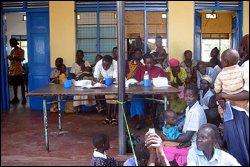This Fall, tens of thousands of people sought refuge in the town of Soroti when the Lord's Resistance Army (LRA) attacked villages in northeastern Uganda. Tonia Marquardt, MD, described the medical emergency, and how families have been torn apart, leaving many in anguish.
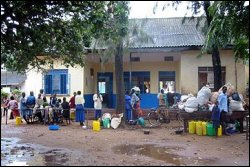
A school yard has become a refugee camp. Photo © MSF |
Today, many thousands of people find shelter in schools, churches and other municipal (or public) buildings. The facilities are overwhelmed and food and medical aid are inadequate. A measles epidemic led to widespread malnutrition and a high death toll among children. Tonia Marquardt, a doctor and nutritional specialist with MSF, described the medical emergency in a report from the field, focussing especially on how families have been torn apart by the violence, leaving many women and children-once again the primary victims-in anguish.
TONIA'S DAILY LOG, OCTOBER 29, 2003
My day began at 8 am. That's not as early as usual, but I worked late last night. Our work began in the hospital measles unit so the team spent the night setting up isolation procedures, distributing cups, blankets, plumpynut [a blended food based on peanuts and used to treat malnourished children] and treatments. There were already 51 patients in that room and more arrive every day.
When I got to the hospital this morning, I first went to the intensive care department and then to see the children in intensive feeding, or "phase 1", at the therapeutic feeding center (TFC). We currently have around 90 children in that unit, so we are very busy.
During my visit, I was very moved what people have endured. A mother and her seven children have been sleeping in a school for three months. No one ever offered them food and they have had to beg to eat. The youngest of her children was admitted to our TFC after getting measles.
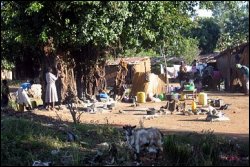
Displaced people have set up camps in the park. Photo © MSF |
Another woman's story is typical of what most of them have been through. Homeless for two months, she came here with her fifth child malnourished and her one-month old baby. The four other children stayed at the school where they have been sleeping since their arrival. The oldest is taking care of the others. "How old is he?" She points to a child next to her who looks like he's no more than 12. "What about the father?" The rebels killed him when he tried to retrieve food from their house. They never received the monthly allotment-meager donations of 6 kilos of flour and one kilo of rice-that is distributed irregularly, anyway. They, too, have had to beg.
These stories have common threads: all the families have been separated by the conflict. Fathers have been killed or trapped in the village, unable to reach the city. In some cases, they join the "Arrow Groups," civilians who try to protect their communities by taking up arms themselves. While they wait, the women and children (on average just five years old) have to manage on their own. If one of the children falls ill, the mother has to leave the others alone so that she can come here. For these people in such a vulnerable situation, family separation is one more significant risk factor.
Every night when I leave the hospital, I see a crowd of mostly children walking down the road. What little they own is gathered in a bundle on top of their heads as they prepare to spend the night in the city streets. Fearing for their safety, many refuse to sleep in the schools. They don't come back until the next morning, when they return to cook and receive aid distributions.
Now the schools are open again. The students have come back and classes have resumed.
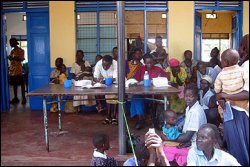
Thousands of people wait outside the hospital in Soroti. Photo © MSF |
In the hospital (and especially in the pediatric unit), every available square foot is occupied. It's terribly overcrowded, even though I'm told regularly that medicines and supplies are in extremely short supply. One nurse hands out medicines. As soon as she's done, it's time to start over again. In these conditions, it's impossible for the staff to follow the most serious cases properly.
It's been like this for three months and things haven't calmed down yet. New attacks are reported almost daily and confirm what we see. There are also stories from other equally affected areas in the region. For the time being, the situation in the villages can't really be assessed.
People are struggling to deal with everything. I'm really struck by the hospital medical staff. They're under pressure but they work tirelessly and keep their spirits up. It's a privilege to be able to help them a little, but so tragic that, once again, it's women and children who bear the heaviest burden in conflicts.
Treating Malnutrition
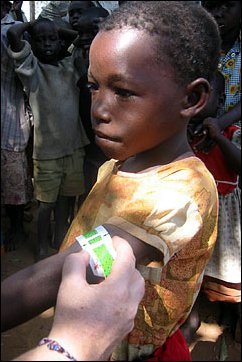
A child is checked for malnutrition using the bracelet of life. Photo © MSF |
If treatment is not done properly, malnutrition can lead to death. The TFCs are often built hurriedly so that they can take in all the children whose health status is questionable (arm circumference less than 110 mm and a weight/height ratio below 70% of normal). Children under 5 are admitted on a priority basis.
A child must eat eight meals every 24 hours to recover from the critical phase of the disease.
A malnourished child remains in the intensive nutrition phase (phase 1) for an average of five days before being admitted into a supplemental feeding program, where he or she will receive three meals a day for another two to four weeks.
The results can be fast and spectacular. The children quickly regain weight during the three-week treatment.
MSF's Intervention in Soroti
In the hospital: TFC (with an average of 150 children)
- measles vaccinations
- work in the pediatric unit
In the district: clinic based in a camp housing 5,000 people
- three mobile clinics
- support provided to health centers
Distribution of supplies: cups, blankets, etc.
